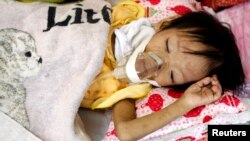Researchers have found that giving antiviral therapy for a limited time to HIV-infected babies soon after diagnosis prevents damage to their immune systems and delays the need for long-term drug therapy.
The South African study, which enrolled 377 HIV-positive infants between six and 12 weeks of age, divided the babies into three groups. Beginning at age seven weeks, one group received antiviral drugs, or ART, and stopped close to their first birthday. The second group of infants receiving ART stopped around the age of two.
Both groups were compared to a third group of young children who were not treated with ART until they began showing symptoms of HIV infection, such as a failure to develop, or when the levels of their immune system CD4 cells became too low.
Mark Cotton, a pediatrician at Stellenbosch University near Cape Town and a study co-author, said in a Skype interview that infants given the shorter, intermediate course of ART - until age one - did not need to restart therapy for about eight months. Those who were on the longer treatment course until age 2 did not need to resume ART for almost a year-and-a-half after temporarily discontinuing therapy.
“Despite stopping therapy, we showed that there was very little morbidity in the children off of therapy, as long as you watched the children and started them at the very first warning sign,” said Cotton.
But the children who were not treated immediately after diagnosis needed to begin lifelong treatment 20 weeks after.
Cotton said delaying lifelong treatment with anti-HIV drugs limits toxic side effects.
Researchers also believe starting ART immediately after diagnosis, driving the AIDS virus to virtually undetectable levels, allows the infants' immune systems to fight off other infections, which Cotton said are more life-threatening in the short term.
“Some of the sicknesses that young babies get, such as diarrhea for example, is much more dangerous in a young infant than in an older child. So protecting them while they are most vulnerable, we are doing the best,” he said.
The World Health Organization began recommending immediate antiviral drug therapy for HIV-infected infants after Cotton’s group reported that early treatment reduced disease progression and death in young children by 75 percent.
An article on the benefits of early AIDS treatment in infants by Cotton and colleagues is published in the journal The Lancet.
The South African study, which enrolled 377 HIV-positive infants between six and 12 weeks of age, divided the babies into three groups. Beginning at age seven weeks, one group received antiviral drugs, or ART, and stopped close to their first birthday. The second group of infants receiving ART stopped around the age of two.
Both groups were compared to a third group of young children who were not treated with ART until they began showing symptoms of HIV infection, such as a failure to develop, or when the levels of their immune system CD4 cells became too low.
Mark Cotton, a pediatrician at Stellenbosch University near Cape Town and a study co-author, said in a Skype interview that infants given the shorter, intermediate course of ART - until age one - did not need to restart therapy for about eight months. Those who were on the longer treatment course until age 2 did not need to resume ART for almost a year-and-a-half after temporarily discontinuing therapy.
“Despite stopping therapy, we showed that there was very little morbidity in the children off of therapy, as long as you watched the children and started them at the very first warning sign,” said Cotton.
But the children who were not treated immediately after diagnosis needed to begin lifelong treatment 20 weeks after.
Cotton said delaying lifelong treatment with anti-HIV drugs limits toxic side effects.
Researchers also believe starting ART immediately after diagnosis, driving the AIDS virus to virtually undetectable levels, allows the infants' immune systems to fight off other infections, which Cotton said are more life-threatening in the short term.
“Some of the sicknesses that young babies get, such as diarrhea for example, is much more dangerous in a young infant than in an older child. So protecting them while they are most vulnerable, we are doing the best,” he said.
The World Health Organization began recommending immediate antiviral drug therapy for HIV-infected infants after Cotton’s group reported that early treatment reduced disease progression and death in young children by 75 percent.
An article on the benefits of early AIDS treatment in infants by Cotton and colleagues is published in the journal The Lancet.




